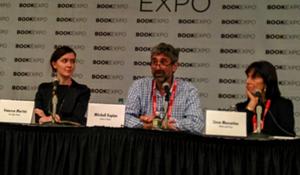"There's really no one answer" about how to deal with customer complaints about titles and authors, said Mitchell Kaplan, owner of Books & Books, with stores in southern Florida and the Cayman Islands, speaking at the BookExpo panel on selling controversial books, sponsored by American Booksellers for Free Expression and moderated by ABFE's Chris Finan.
How to deal with such complaints, Kaplan continued, depends "on the mission of the store and how they see themselves in community." At Books & Books, complaints about "carrying or not carrying a certain book" have been treated individually, he said. "Everything has to do with the context in which it's come up." He emphasized that open communication with customers about such issues is crucial, so that they understand the store's approach.
 |
|
| Vanessa Martini, Mitchell Kaplan and Lissa Muscatine | |
Kaplan discussed the store's differing reactions to several complaints and controversial books during his 35 years in business. His first such experience involved a complaint that his first, tiny bookshop didn't carry the Bible. He solved this by stocking The Penguin Bible. When the Ayatollah Khomenei issued a fatwa in 1989 against Salman Rushdie because of The Satanic Verses, Books & Books took "a very, very strong position. It needed to be exhibited and proudly sold." When Madonna's book Sex appeared in 1992, "people were coming down hard on bookstores across the country for carrying that." Sex sold out almost immediately, and Books & Books kept one copy and charged customers $1 to look at it and donated the fee to a nonprofit organization.
More recently, when Malcolm Nance made an appearance to promote The Plot to Hack America, several people in the audience repeatedly tried to interrupt his presentation, and Kaplan had to stop the proceedings to tell one "very belligerent" man to leave. The man did leave but stood outside the store yelling, and later gave Books & Books a "nasty" Yelp review for its café. "It happens as much on the right as the left," Kaplan added.
Throughout his bookselling career, Kaplan said, he has emphasized to customers that when an author appears in his store, "I've invited them, it's my store, they're my guest, and it's my duty to keep decorum and make sure they get the respect they deserve."
Vanessa Martini from City Lights, San Francisco, acknowledged that the store is known for being "widely left and radical," but still is criticized sometimes by people "even further left than us." She recommended identifying people on staff who are good at de-escalating bad situations and who can "control and get a person out of the store who shouldn't be there any longer."
Like the other panelists, Lissa Muscatine, co-owner of Politics and Prose, Washington, D.C., said the store is "very fiercely protective of decorum and protocol and respect and civility," something that staff sometimes reminds the audience of when making introductions.
Politics and Prose is "in a progressive, liberal part of a political city," she noted, and is "known for being on that side of the spectrum," but has made an effort to have more conservative authors come and speak. "We don't want to speak to the choir," she commented. This has led to some difficult situations, with the store being attacked from left and right, particularly on books about the Middle East.
In addition, an appearance by Pat Buchanan led to "some good discussions" with the staff, since some of them considered him a racist and were "upset that we would have him."
In the Trump era, "we've never felt our mission as an independent bookstore stronger than now, in part because we can serve as an antidote to the increased radical polarization and attempts to silence and attempts to dismiss expertise and attempts to dismiss discussion and really good, rigorous debate, which is what we need. Since those are the hallmarks of a lot of what's happening in the political realm today, we feel particularly strongly about trying to present as many points of view as we can in a thoughtful and respectful way."
Asked about how they would deal with a book that they find personally offensive, panelists discussed several approaches. Muscatine said if a book was "just a purveyor of hate," she wouldn't stock the title, but would order it if someone asked for it.
Martini noted that by its nature, City Lights "doesn't have to carry a lot of books that others have to carry," and that "fortunately my ideology is closely aligned with City Lights'," which won't sell anything hateful.
Kaplan noted that Books & Books serves "a diverse community, and we want to carry diverse inventory politically and artistically," which usually causes no problems although some titles will be "personally anathema to me."
He remembered early in his bookselling career occasionally being asked for the fake, anti-Semitic book The Protocols of the Elders of Zion, which at the time was available only from the far-right John Birch Society. Disgusted by both the book and the organization, Kaplan wouldn't even do special orders for the book, since "I refused to write a check to the John Birch Society."
Concerning the controversy about Dangerous, the book by Milo Yiannopoulos that earlier this year Threshold Editions was going to publish--a move that many in the business objected to--the panelists generally didn't support the idea of calling for publishers not to publish controversial books. Martini said, "I personally wouldn't ask a publisher not to publish something. It's not my place. My business is stocking my store."
Muscatine said, "We don't want to upend the First Amendment in any form."
And Kaplan emphasized that boycotting or demanding a publisher not publish a book is "a very slippery slope... today it's a book we don't want published, and tomorrow it will be a book we do want published." --John Mutter

